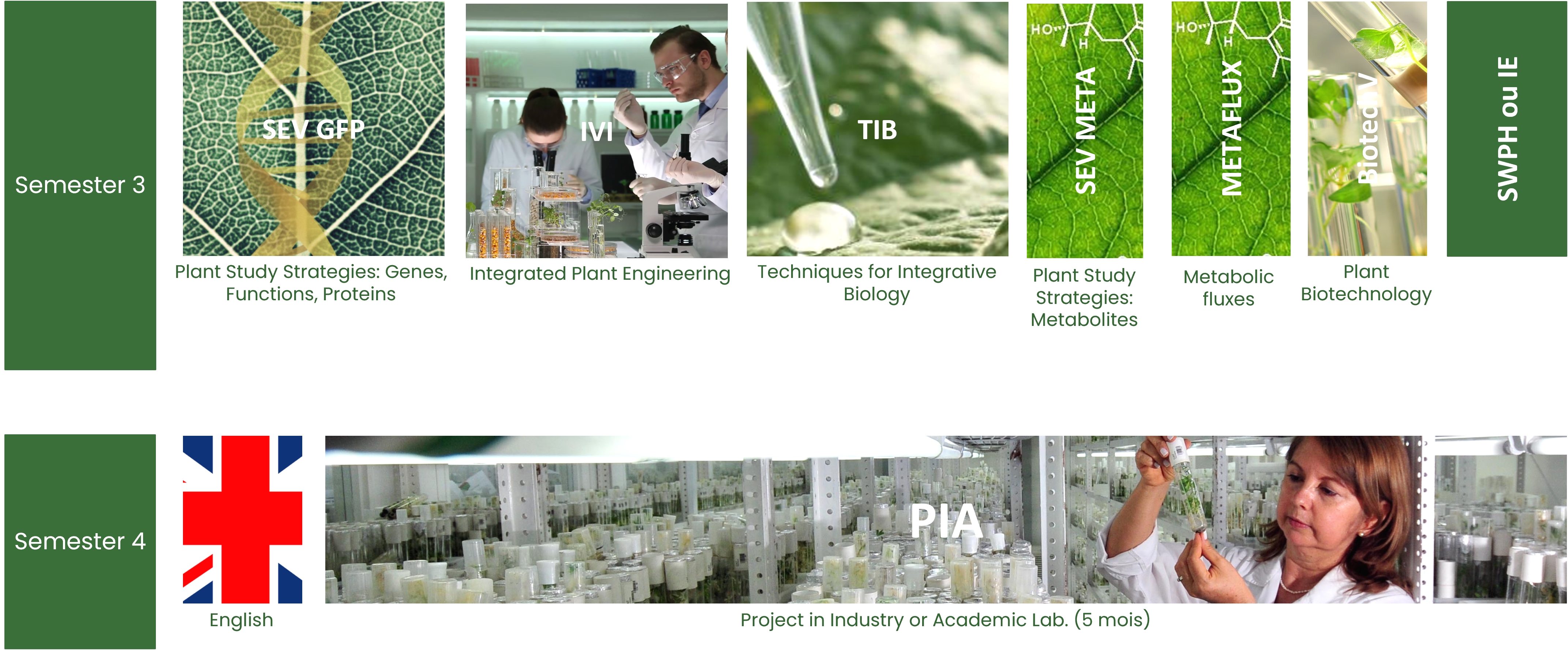Goals:
This M2 “PHYTO” “Plant resources and Plant sciences” is for students who want to get a high-level training knowledge in the fields of basic and applied plant biology. It is in line with M1. After obtaining this M2 PHYTO, students will either enter into working life or complete a doctoral thesis.
The program offered during this second year of Master’s Degree is purposely a multidisciplinary program, combining a thorough knowledge of plants, their physiological and developmental particularities, their potentials of use and valorisation with the interface chemistry – Biology (biotechnologies, phytochemistry, crop improvements, …). Students will also gain a solid knowledge of tools and techniques to understand concepts that are developed in plant biology, in the aim of getting them well prepared for their end-of-course internship.
Students who have validated year 1 (M1) with 60 ECTS can qualify for year 2 (M2).
A direct registration to year 2 is also possible, subject to availability, for students who have obtained 240 ECTS in another French or foreign University.
In all situations, the applicants will be selected upon review of their academic records and interview with a panel.
Program:
The M2 PHYTO programs includes Teaching Units which are common to the international mixed course Plant-Microbe Interactions for Plant Health (M2 PMIP). Most of the courses are thus given in English.
The Teaching Units come as a supplement to the program given in the 1st year, adding as well a technical and methodological feature to the training.
Thus the following Teaching Units: SSP META, SSP GFP, METAFLUX, BIOTECH V and TIB feature the main strategies used to deal with the themes and concepts taught in this program, most of them applied in IPE, which is an entirely Teaching Unit.
The aim is to prepare students for their end-of-course internship (PIA) then for their working life.
Two Teaching Units complete the training, offering programs dedicated to either professional integration or scientific intelligence. Students may thus choose the Teaching Unit according to their career aspiration (professional or research).

Plant Study Strategies: Genes, Functions, Proteins PSS GFP (6 ECTS):
This Teaching Unit presents the major strategies used to describe gene expression and function, as well as their products.
Plant Study Strategies: Metabolites PSS META (3 ECTS):
The aim is to enable students to be introduced to the various extraction, purification and characterisation methodologies of plant metabolites.
Metabolic Fluxes METAFLUX (3 ECTS – English TU):
The aim is to enable students to be acquainted with the main metabolism pathways as well as their interconnections in the context of the cell and organism function.
Plant Biotechnology P BIOTECH (3 ECTS):
The lessons given here introduce plant biotechnologies together with:
- Theoretical foundations (cellular totipotency, in vitro plant growth and development, molecular mechanisms….)
- Methods (in constant evolution)
- fundamental (genes and function identifications) and practical (plant improving) applications.
Students will also be given an approach of the latest techniques for improvement and production of the molecules of interest (New Breeding Techniques, Metabolic Engineering).
Integrated Plant Engineering IPE (6 ECTS):
The plant biology methods and concepts dealt with in the other Teaching Units are here applied.
This fully practical teaching takes place on experimental platforms, which gives students the opportunity to deal with the latest scientific techniques
Techniques for Integrative Biology TIB (6 ECTS – English TU):
These all-English lessons enable to deal with the different omics techniques, from the gene to the metabolite and even the phenotype both through theory and partly through experimental data processing.
Professional Integration PI (3 ECTS):
Gives a better knowledge of the industrial world.
Scientific Watch for Plant Health SWPH (3 ECTS English TU):
The objective of this Teaching Unit is to give the partial background and inform about strategic approaches in both fundamental and applied plant science research.
English (3 ECTS):
The objective is to reach at least the CECRL B2 Level.
Project in industry or Academic Lab (PIA 27 ECTS):
This Teaching Unit corresponds to the end-of-course internship that will be done, according to the student’s professional project, in a private company, an industrial laboratory, an academic research laboratory, a community…
M2 admission requirements for the year 2025 – 2026:
Calendar :
Opening application date on the eCandidat platform : https://ecandidat.univ-lyon1.fr/: to be determined
Closing application date on the eCandidat platform : https://ecandidat.univ-lyon1.fr/: to be determined
Application reviews to be determined
Response notification to the applicants: to be determined
The results will be available online, on the eCandidat platform: https://ecandidat.univ-lyon1.fr/
Deadline to accept or reject your admission to the program: early july for the students admitted on the final list.
Acceptation or rejection are to be made online ONLY, on the eCandidat platform: https://ecandidat.univ-lyon1.fr/